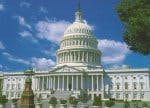As lawmakers get down to legislative business, trade associations representing laboratory operators will push hard for passage of the Medicare Laboratory Services Access Act. Introduced in the final days of the last session by Rep. Phil English, R-PA, and Peter Deutsch, D-FL, the bill would increase the Medicare specimen collection fee for fiscal 2002 to $5.25 from its current rate of $3.
The proposed new payment of $5.25 represents the amount the fee would be today had the fee been indexed annually to the Consumer Price Index, English said when he introduced the measure. For subsequent years, the bill would allow for an annual adjustment based on increases in the CPI.
The specimen collection fee has not been increased since 1984, according to Mark
Birenbaum, Ph.D., American Association of Bioanalysts (AAB) administrator in St. Louis, MO.
In introducing the bill, English pointed out that laboratory tests only account for 1.6 percent of the total Medicare budget, but are used in 70 percent of medical decision making.
Trade associations supporting the legislation include AAB, the American Association for Clinical Chemists, the American Clinical Laboratory Association, the American Society for Clinical Laboratory Science, and the American Society for Microbiology.
The legislation also seeks to remedy a financial burden imposed on laboratories by new regulations requiring safe needles and related practices. In January 2001, the Occupational Safety and Health Administration (OSHA) implemented new bloodborne pathogen rules designed to improve worker safety. English said no additional funds have been provided to implement these requirements.
The increase in the specimen collection fee would help offset the costs of the regulations as well as recognize inflationary increases over the past 17 years, he said.
The lab groups who back the measure are working with lawmakers to gather the support of other House members and to locate a Senate sponsor.
One-year extension of HIPAA electronic transaction standards
President Bush recently signed a bill into law permitting providers, healthcare clearinghouses, and most health plans to obtain a one-year extension of the Oct. 16 compliance deadline for electronic transaction and code sets enacted as part of the Health Insurance Portability and Accountability Act of 1996 (HIPAA).
Under the new law, those wishing to obtain a one-year extension must submit a plan detailing how they will come into compliance with the regulations by Oct. 16, 2003.
The Washington, DC law firm of Arent Fox points out that the compliance plan must include a number of elements, including a budget, schedule, work plan, and implementation strategy for achieving compliance, and must also state whether the person plans to use or might use a contractor or other vendor to assist in achieving compliance.
In addition, the law also imposes a new requirement mandating that, with limited exceptions, all Medicare claims for services and supplies provided under both Part A and B be submitted electronically by Oct. 16, 2003. Institutional providers with fewer than 25 full-time employees and physicians, practitioners, facilities, or suppliers with fewer than 10 full-time employees, are not required to submit claim forms electronically.
New rule in New York State prohibits free supplies to physicians
On the state scene, new regulations in New York will prohibit laboratories from providing free supplies to physicians. In a letter to New York laboratory operators, Betty Kusel, a New York state official, informed lab operators they have until Feb. 25 to reclaim supplies such as gloves from physicians. Under the regulation, physicians also may purchase the supplies at a price consistent with fair market value.
Kusel pointed out that the New York Department of Health will consider further modifications to compensation arrangement exceptions that would make the regulation conform more closely to the federal Stark law regulations published in January 2001.
The states Division of Laboratory Quality Certification will scrutinize business practices that have significant probability of improperly induced referrals, Kusel added. She intends to rely on the laboratory community to help identify situations of noncompliance.
While this recent regulation is limited to New York, AABs Birenbaum expects the issue to become a more significant one nationally. For example, the new Stark II physician self-referral rules may have an impact on supplies laboratories provide to physicians for collecting or transporting specimens.
Joan Szabo is a Washington, DC, freelance writer specializing in healthcare issues. She has been writing the Washington Report column for MLO for the past five years.
© 2002 Nelson Publishing, Inc. All rights reserved.


